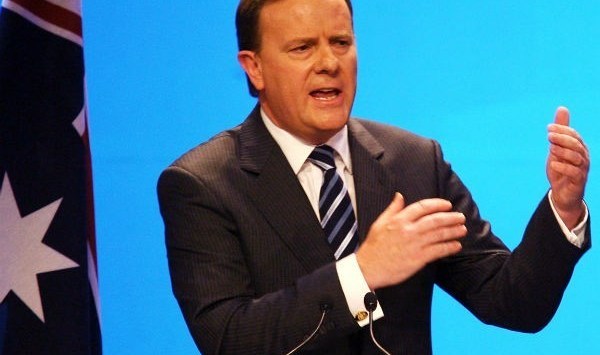

A government that can’t balance its books is like an ice addict, according to Peter Costello, who spoke at a Women in Banking and Finance lunch today.
The former treasurer delivered 12 federal budgets, 10 in surplus, and is now chairman of the $160 billion Future Fund.
Here are seven gems from Costello’s take on Australia’s economy and the government’s policies.
1. The government needs to get the budget in balance
“A government short of money is like an ice addict short of supply,” Costello says.
“It will do things it wouldn’t do to try and balance its budget.”
He says if the budget is in balance you don’t get these “bad policies”.
“If it’s not [in balance] then everything becomes possible.”
2. Monetary conditions still haven’t normalised
The Australian sharemarket is still not back to the levels it was in 2007 and Costello says this can be compared to the United States where the stock market is “many times higher” than in 2007 thanks to quantitative easing.
“What happens when monetary conditions normalise?” Costello says.
“That’s the thing we’re trying to get our head around at the moment.”
3. We don’t understand China
Last week’s move by the Chinese government to stop trading on China’s sharemarket following a plunge has some valuable lessons for Australia, according to Costello.
“We look at China from the outside and at one level we think we know how it operates,” he says.
“But it doesn’t really operate the same way as we do. It’s not a transparent system.”
Costello says you always have to remember that the Chinese government has a lot more control in China than any Western government does in the West.
“It is motivated by a lot of things that don’t really come into the decision making of Western leaders,” he says.
4. If the government increases GST, they’ll waste it
Costello says the government needs to broaden the base of the GST rather than increase it.
“Our plan was for a GST for a lot broader base,” he says.
Costello says the GST taken to the election was on food but this got shot down in the Senate, which means the GST now only applies to 85% of the economy, causing problems.
“I always wanted a broader base,” he says. “It’s a great reform.”
But Costello says there is a lack of vision about what would be done with increased GST revenue.
“Don’t ask me about broadening the base tell me what you are going to do with the money,” he says.
Costello says he is against increasing the GST.
“I just think the government would waste it,” he says. “If you put it up 2% to get another $10 billion they would probably just waste it.”
5. Abolishing negative gearing is not the answer to rising property prices
Costello was dismissive of the RBA’s call for a review of negative gearing, pointing to Paul Keating’s ill-fated attempt to abolish negative gearing for a brief period of time in the 1980s.
“People talk about negative gearing as if it only applies in property,” he says.
“Negative gearing is just a branch of general tax law which says anyone who incurs a general expense can deduct that general expense”.
Costello says negative gearing is not the driver of rising property prices.
“What’s causing property rates to go up at the moment is interest rates,” he says. “If interest rates go down property prices go up, they have to. The quickest way to bring down property prices in Australia is to double the interest rate.”
6. Bring property prices down through more supply
Costello says rising property prices can be attributed to more demand than supply.
“We know supply is very limited and you can bring property prices down an awful lot if you release supply,” he says.
Costello says housing is not expensive in Australia, land is expensive.
“The amazing thing is Australia has almost unlimited land,” he says.
But Costello says the problem is Australia’s population mostly wants to live in big cities, mostly in Sydney and Melbourne, and land release is limited in Sydney and Melbourne.
7. More certainty is needed for superannuation
Costello says around 80% of people who have superannuation will never save enough to get off the pension and instead will use it to supplement their pension.
For the 20% who will take care of their own retirement, Costello says incentives are needed for putting voluntary money in.
“So I think there is a big case of tax incentives for those people,” he says.
But Costello says the main problem with superannuation is you don’t know what the rules are going to be from year to year.
“I can’t tell you what the rules will be next year, let alone 2045,” he says.
“We’ve got to get some certainty.”
Costello also says it’s problematic that you can’t touch your super but the government can.
“That’s the thing that gets me,” he says.
“The government can get money out of your super by changing the taxation rate, that’s not a very good deal.”


COMMENTS
SmartCompany is committed to hosting lively discussions. Help us keep the conversation useful, interesting and welcoming. We aim to publish comments quickly in the interest of promoting robust conversation, but we’re a small team and we deploy filters to protect against legal risk. Occasionally your comment may be held up while it is being reviewed, but we’re working as fast as we can to keep the conversation rolling.
The SmartCompany comment section is members-only content. Please subscribe to leave a comment.
The SmartCompany comment section is members-only content. Please login to leave a comment.